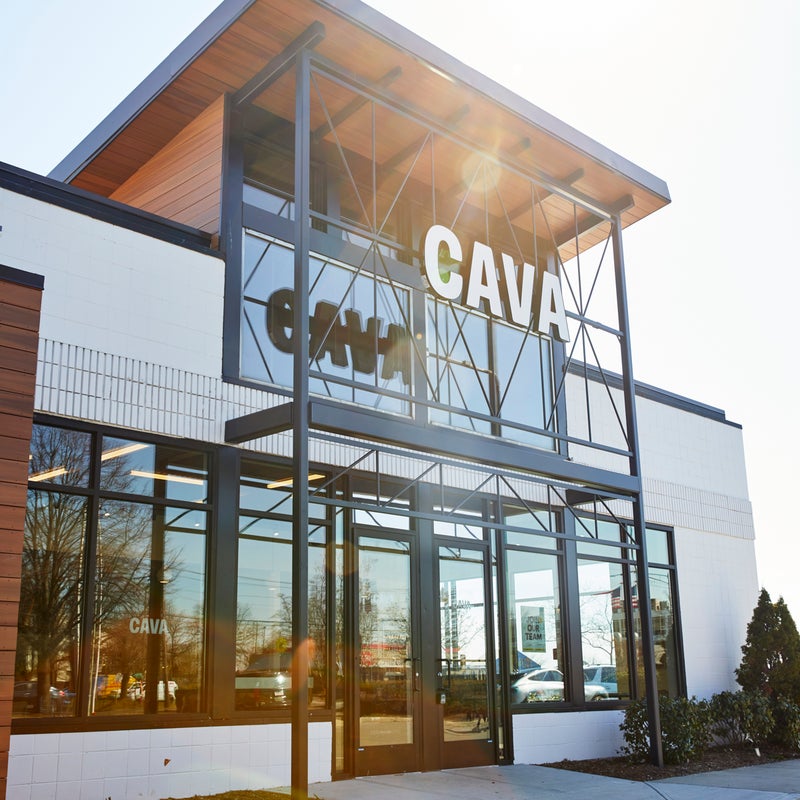When DC’s Mediterranean chain Cava made its IPO last week, it left plenty to celebrate.
For the fast-casual chain itself, there was the $318 million it made in the process, valuing the company at $4.88 billion before its even reached profitability and making way for a planned 60-t0-70-store opening this year. But for other food companies homegrown in the DMV, it also represented a successful public company in the sector that stayed in DC.
Cava’s recent IPO might remind you of a different DC fast-casual success: the IPO of Sweetgreen in 2021. But there’s one major difference: Though Sweetgreen was started in Georgetown, its founders eventually moved HQ to California, while Cava is DC-born and -raised — and its district roots aren’t yet overturned.
A local success story is crucial for future ecosystem growth, as Forrest Wright, a Startup Genome research assessment lead, recently told Technical.ly. Founders with successful exits, he said, often stay in the area, have a network to share experience and boast plenty of new money to invest back into local founders.
“It’s representative of a very strong and healthy ecosystem because when you get a large exit. It means that that startup came up in Washington,” Wright said. “They went through the funding pipeline and they built a pretty strong company with a good foundation and hired employees to get that kind of valuation. So it’s almost like a lagging indicator of an ecosystem’s health. ”
It’s not quite an exit, but Cava’s news begs the question: what does a second prominent IPO mean for DC’s fast-casual and general food startup scene?
A tale of two to-go companies
Georgetown University alumni Nicolas Jammet, Jonathan Neman and Nathaniel Ru founded Sweetgreen two months after graduating in 2007, opening their first spot on M Street NW. The company added 22 locations up and down the East Coast over the next six years and landed investments from local VC firms like Revolution, T. Rowe Price and Durable Capital Partners, eventually growing to its current state.
There are distinct similarities between Sweetgreen and Cava’s journeys. Both offer fast-casual, generally healthy food and cater to a generation that loves to create their own bowls. Cava, which was founded in 2006, also found investors in T. Rowe Price and Revolution. Cava landed one of 2021’s biggest rounds with a $190 million Series F and acquired DC’s Zoës Kitchen in 2018; similarly, Sweetgreen acquired Galley, a DC meal delivery startup, in 2019.
Sweetgreen did not respond to a request for comment and Cava declined to comment on its news.
According to Eman Pahlavani, cofounder of Rosslyn, Virginia catering tech startup HUNGRY, both companies also had a good product, listened to their customers and continued to iterate. Both also do a lot of internal culture building, he added, which creates brand loyalty.
And the rest was up to the ecosystem they were building. As Startup Genome recently noted by marking DC as the 11th best place to start a startup globally, the DMV region has some strong assets for building a startup turned empire. But, historically, it hasn’t necessarily been known for food companies. The area is nationally known for politics and government contractors, Pahlavani said.
Still, he thinks fast-casual companies have done a great job so far of growing quickly, making a name for themselves and bringing up DC’s food tech profile.
“It’s empowering for young entrepreneurs and founders to want to get into the food tech space or the food space,” Pahlavani told Technical.ly. “[It means] that you can start a company in the DMV, you can grow it really quickly and ultimately have a successful outcome via an exit or an IPO. … For college students who are looking for a path, trying to make their own way, I think this is a great blueprint to follow.”
When first starting HUNGRY, he added, he and his cofounder/brother Shy looked to companies like Sweetgreen, which was looking to solve the same problems they were experiencing. He hopes Cava’s success can offer a similar inspiration.
“When you see stories like the Sweetgreens, like the Cavas, it’s empowering. It makes you think that if they’re able to do it, you’re able to do it, and it helps you take those first steps,” Pahlavani said. “Watching kids right out of college start a company and grow it quickly is always motivating, always inspiring and it helps the next generation also do the same.”
So, what’s the next food tech chain that will make it big? In DC, Call Your Mother deli and Compass Coffee have both been making noise, and Pahlavani thinks Halal Shack will be the next big thing nationally. And, though he might be a little biased, he noted that HUNGRY, a catering tech company, is also looking to tee up the IPO path, continuing the chain.
“We don’t see it as competition, we see it as growing the market in this area,” Pahlavani said. “As these companies expand, it’s inspiring and others will want to do the same thing — especially when they see the success of the team, of the company, of people who love their product. And so, it’s going to be, overall, really good for the DMV moving forward.”
Join the conversation!
Find news, events, jobs and people who share your interests on Technical.ly's open community Slack






